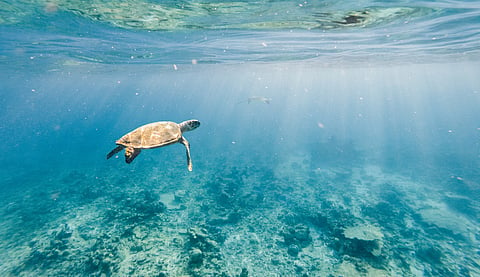

As many as 17 countries, including France and Brazil, on November 18, joined the Blue NDC Challenge and extended strong support for establishing a new Ocean Taskforce at the 30th Conference of the Parties (COP30) to the United Nations Framework Convention on Climate Change in Belém to strengthen the integration of ocean-based climate actions into their national plans, ensuring these commitments translate into real policies and results.
At COP30, countries also unveiled the “Blue Package,” a coordinated plan under the five Ocean Breakthroughs—marine conservation, aquatic food, ocean renewable energy, shipping, and coastal tourism—to accelerate solutions across these sectors. The plan aims to address interconnected global challenges such as biodiversity loss and food and energy security, while providing a pathway for non-state actors to support the implementation of Blue NDCs and advance synergy across the Rio Conventions.
The proposed mechanism—formally the Blue NDC Implementation Taskforce—aims to accelerate integration of ocean-based solutions into national climate plans while linking ocean resilience to clean energy expansion, job creation, and coastal community development.
The initiative builds on rapidly rising political momentum. With nine in 10 countries now incorporating ocean priorities into their Nationally Determined Contributions (NDCs), the ocean has emerged as a strategic pillar of climate ambition. The launch also coincided with Belgium, Cambodia, Canada, Indonesia, Portugal, and Singapore joining the Blue NDC Challenge, expanding the coalition driving ocean-climate action.
According to a World Resources Institute paper, the 2025 update of global NDCs shows unprecedented momentum for ocean-based climate action, with 61 of 66 updated NDCs including ocean measures. Yet major gaps remain: adaptation dominates, while mitigation—despite the ocean’s potential to deliver up to 35 per cent of needed emissions cuts—accounts for only 12 per cent of commitments.
Conservation and blue carbon ecosystems are the most widely adopted actions, while key sectors like offshore renewables, shipping decarbonisation, and low-carbon aquatic food systems remain underrepresented and underfunded. Equity is referenced in just 13 per cent of ocean actions, and ocean-related climate finance continues to account for less than 1 per cent of global flows, the paper says.
Announced at a high-level ministerial event hosted by France and Brazil, the new taskforce is designed to mobilise political leadership, unlock both public and private finance, and expand technical support to governments embedding ocean solutions in their climate and development strategies. Its goal: close the longstanding “ocean opportunity gap,” with ocean action historically receiving less than 1 per cent of global climate finance despite its mitigation and adaptation potential.
Officials emphasised that ocean-based climate solutions—from offshore renewable energy and high-integrity blue carbon ecosystems to decarbonised shipping and sustainable fisheries—can drive low-carbon, climate-resilient economic growth. Research suggests such solutions could deliver up to 35 per cent of emissions reductions needed to keep the world on a 1.5°C pathway by 2050.
Speaking at the event, Enrique Javier Ochoa Martinez, Mexico’s Under-Secretary for Multilateral Affairs and Human Rights, issued a clear warning: “Unfortunately in these last 10 years, climate impacts have moved from projections to reality. Yet our ocean remains insufficiently recognised despite covering 70 per cent of our planet. Because it is out of mind and out of sight, it has remained out of mind of climate policy. The ocean climate nexus must be central to both national and global decision making.”
Panama’s special representative for climate change, Juan Carlos Monterrey, added: “The big blue elephant that has been missing from the entire climate conversation is the ocean, and finally it’s here.”
Belgium highlighted how ocean-climate action aligns with industrial transformation already underway. Ulrik Lenaerts, Deputy Director for Environment and Climate Policies, emphasised that Belgium is leveraging the North Sea as a renewable energy hub while pushing for the transition to zero-emission shipping. “Moving to zero-emission shipping needs to be part of the climate solution,” he said.
For countries leading the initiative, COP30 marks a decisive pivot from high-level commitments to delivery. The Taskforce aims to support governments as they update and implement their 2030 climate plans, including strengthening blue carbon pathways, scaling nature-based solutions, modernising coastal infrastructure, and supporting maritime industries to adopt clean technologies.
As global multilateral cooperation faces increasing strain, the France-Brazil partnership—anchoring a coalition of coastal, island, and ocean-economy nations—sent a strong signal that accelerating ocean-climate solutions is both achievable and urgently needed.
If successful, the Taskforce could help ensure ocean action becomes a driver of sustainable development—creating jobs, protecting biodiversity, improving food security, and securing the livelihoods of coastal communities worldwide—while delivering the climate results required in this decisive decade.